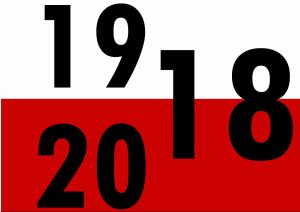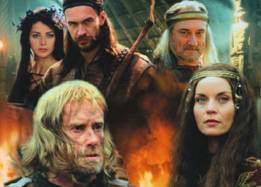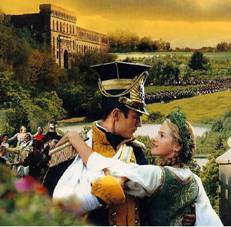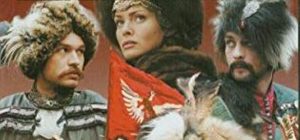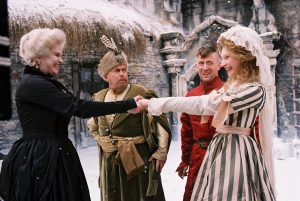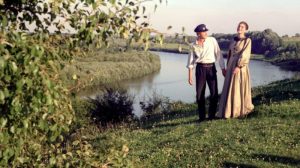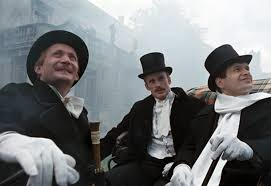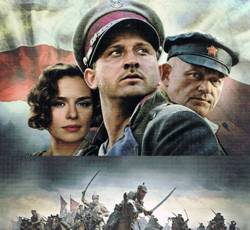100 Years of Poland 2018: Films Series
Starts 1st July till mid September 2018
This Polish films series covers a wide range of periods, styles and genres, including struggles for freedom and life under foreign and communist rule. It is part of the Polish Museum’s celebration of the Centennial Year of Poland regaining its independence at the conclusion of WW1 in 1918. Both heroes and ordinary citizens called to step up in extraordinary times feature in many of these popular films, which include masterpieces by Andrzej Wajda and George (Jerzy) Hoffman, with classic adaptations of much-loved stories featuring some of Poland’s best actors.
Individual and small family bookings are not required, open to the public, entry by individual donation.
Sundays and Thursday afternoons. All films start at 2pm sharp.
Please contact museum staff for any queries….
‘When the Sun was a God / Stara Baśń’ dir. George Hoffman (2003).
This drama/fantasy tells the legendary story of King Popiel. It is set in Poland’s pagan times with fast action, explicit battles, romance and spectacular costumes. The fates of the characters interlace in an everlasting fight between good and evil and human passions of love, hatred and the greed for power.
The story focuses on Popiel, an evil and oppressive ruler who uses force unjustly on neighbouring people. The people unite and make an effort to overthrow him. Within the story are the Sun deity, a four faced statue worshiped by the Poles, and the Viking Odin, a second force portrayed as a very powerful group of warriors, who battle the pre-historic Poles.
The battle scenes are graphic and bloody with realistic special effects and sheer brutality.Of course, there is a love story complete with magical pagan rituals and dance. The movie contains eerie music and beautiful photographic imagery.
This feature film, based on an 1876 novel by Józef Ignacy Kraszewski, was released in the UK in 2011 under the title ‘Army of Valhalla’.
If you enjoy historical movies you have to watch this one..
Subtitles. Age 16+. 2-4.30 pm (135 min)
Museum entry by donation. Polish Museum, 125 Elliot St, Howick. Ph 533 3530
‘Quo Vadis / Where are you going?’ dir. Jerzy Kawalerowicz (2002).
This masterpiece tells of a love that develops between a young Christian woman of royal descent, Ligia, and Marcus Vinicius, a Roman patrician. It takes place in Rome under the rule of Emperor Nero, around 64 AD amidst Christian persecutions.
Nero is portrayed as a sinister tyrant, personifying the decadence of the empire. Among the other real historical characters are the writers Petronius (d. 66), a rich aesthetician, and Seneca (d. 65), who opposes Nero.
This elaborate version of the Nobel Prize–winning novel written by Henryk Sienkiewicz, one of the first novels adapted for the screen, is said to be Poland’s biggest movie ever with a cast of thousands. It can also be seen as Sienkiewicz’s contribution to the struggle of the Polish people against repression, conveying a message of faith and hope.
Subtitles. Age 16+. *2-5 pm (172 min)
Museum entry by donation. Polish Museum, 125 Elliot St, Howick. Ph 533 3530
Pan Tadeusz or Mr Tadeusz, recounts the story of two feuding noble families and the love between Tadeusz Soplica (the title character) of one family, and Zosia of the other. Beautiful scenes and period costumes make this a must see…
The subplot involves a spontaneous revolt of the local inhabitants against the occupying Russian garrison.
The story takes place over the course of five days in 1811 and one day in 1812 at a point in Polish history, when Poland-Lithuanian Commonwealth had already been divided between Russia, Prussia, and Austria. The scene is set in the Lithuanian village of Soplicowo.
‘With Fire and Sword / Ogniem i Mieczem’ dir. Jerzy Hoffman (1999)
This historical adventure drama is based on the novel ‘With Fire and Sword’, the first part in ‘The Trilogy’ by Nobel prize-winner Henryk Sienkiewicz. At the time of filming it was the most expensive Polish film ever made.
The story is set in Ukrainian lands of the Crown of the Kingdom of Poland during the Khmelnytsky Uprising of 1648-51. A Polish knight, Skrzetuski, and a Cossack, Bohun, both fall in love with the same woman, Helena. Their rivalry unfolds against the backdrop of a Cossack uprising led by Bohdan Khmelnytsky, aimed at reclaiming control of the land from the hands of the Polish nobles.
Historic events form a framework for an action and character driven plot, and fictional characters mingle with historic ones. The movie culminates with the savage siege of Zbarazh, as does the book.
Subtitles. Age 16+. *2-5 pm (176 min)
Museum entry by donation. Polish Museum, 125 Elliot St, Howick. Ph 533 3530
‘In Desert and Wilderness’ dir. Gavin Hood (2010).
Captions available for deaf community by request.
Stas (14) and Nel (8) are thrilled to be with their fathers in exotic Egypt. The palm trees and beaches offer a welcome change from the chills of Europe and the children are fascinated by the different languages and religions of North Africa. During the night, Stas and Nel are kidnapped by Egyptian rebels. As the children of Suez Canal engineers, they are valuable hostages, but they soon escape with the help of two young Africans. While their fathers organize rescue parties, the children’s adventure takes them across the beautiful, vast desert.
This popular feature film with beautiful cinematography is set in 1890 and based on the Nobel prize-winning novel for youth ‘W pustyni i w puszczy’, written in 1912 by Henryk Sienkiewicz.
School holiday family entertainment.
English. Age 7+. 2-4pm. Captions available for deaf community by request.
Museum entry by donation. Polish Museum, 125 Elliot St, Howick. Ph 533 3530
‘The Revenge / Zemsta’ dir. Andrzej Wajda (2002).
In this period comedy, royal cupbearer Raptusiewicz resides in one half of a castle, with the other half inhabited by his hated rival Regent Milczek. Raptusiewicz wishes to marry the Podstolina (widow of the Lord High Steward) for her money, while the Podstolina seeks a wealthy match for herself. Regent Milczek’s wish, on the other hand, is to bring about the union of his son Waclaw with the Podstolina. To complicate matters more, Waclaw is in love with Klara – ward and niece of the Cupbearer, who took her in, following the death of her parents – and the feeling is mutual. The plot thickens when Klara turns into Papkin’s declared object of love …
This adaptation of a stage drama by A. Fredro was inspired by true events from 1828.
Subtitles. Age 16+. 2-4pm (100 min)
Museum entry by donation. Polish Museum, 125 Elliot St, Howick. Ph 533 3530
‘On the Banks of Niemen / Nad Niemnem’ dir. Zbigniew Kuzminski (1986).
Justyna Orzelska and Jan Bohatyrowicz fall in love, but can’t be together as one comes from nobility and the other is a commoner. A battle between love and social status brews in this sweeping historical drama set in 1863, during the Polish insurgence against Russian control. Will their love survive, or will society rip them apart?
This film is based on the Polish novel ‘Nad Niemnem’ by Eliza Orzeszkowa, who was twice nominated for the Nobel Prize. Orzeszkowa wrote to preserve Polish culture and heritage for generations of her contemporaries, who had only known life under foreign occupation for 123 years. Her patriotic writings, imbued with love of Poland, its people and land, as well as its traditions resonated just as deeply with immigrants in America as it did for the Poles living in Poland under foreign rule.
Subtitles. 2-5pm. (160 min)
Museum entry by donation. Polish Museum, 125 Elliot St, Howick. Ph 533 3530
‘Promised Land / Ziemia obiecana’ dir. Andrzej Wajda (1975).
This historical drama is set during the late 19th century in Lódz, the cradle of the Polish textile industry, which seems to be a promising place for European migrants to Poland.
The film begins when three dispossessed but industrious men, a Pole, a Jew and a German set out to build their own factory. As one of them says, “I have nothing, you have nothing, he has nothing: this means we have enough to start a factory.”
But complicated relations in the world of manufacturers and a dangerous affair can destroy visionary plans.
‘Ziemia obiecana’ was the nickname of the city of Łódź , given by immigrants arriving in the industrial centre, searching for the prosperity promised by rapid modernization.
Viewers have commented that this film, made during the communist era, is also anti-capitalist.
Subtitles. Age 16+. Thursday Midweek (138 min)
Warsaw residents Ola and Jan experience one of the most important battles in world history. The Battle for Independence halted the Red Army’s march on Europe in the aftermath of WW1, forcing Lenin and Trotsky to resign from lighting the ‘flame of the world revolution’.
However, it is not the historical figures, apart from Pilsudski, who will play a decisive role in this film. The entire burden of action and the involvement of the audience’s emotions falls on the shoulders of the two literary characters: Ola, a revue theatre actress and her recently married husband Jan, a communist-supporting idealist. The fighting lines will be shown by Jan’s fate. Ola will be a participant and witness of the emotions experienced by the residents of Warsaw.
The 1920 Battle of Warsaw is the only battle fought and won by the Poles, unassisted by others, since the 17th century.
